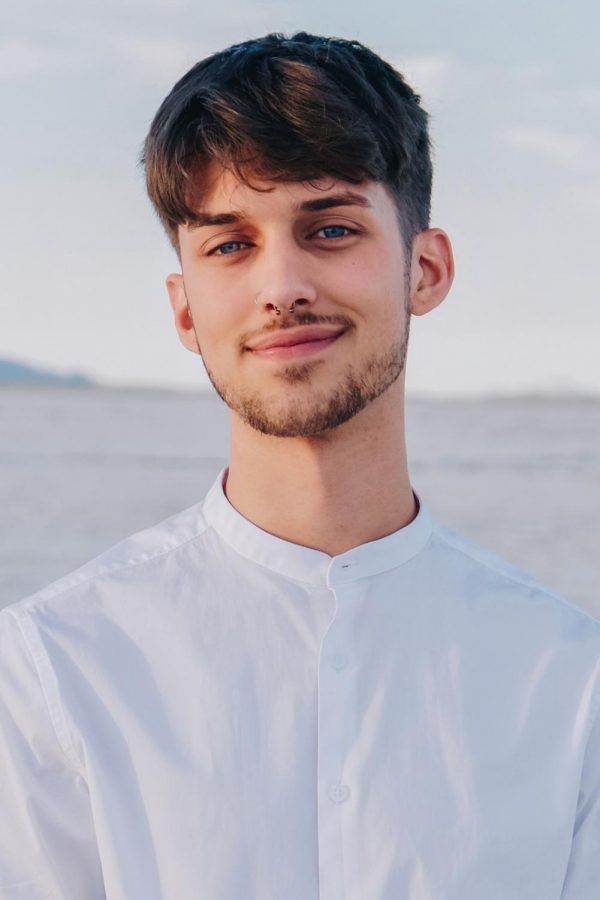Farewell: Cade Anderson
April 28, 2021
As I wrap up five years of college and four semesters of writing for the Chrony Arts Desk, I feel a strange mixture of pride, nostalgia and disorientation. I don’t really know what to do with myself without the familiar routine of lectures and the measuring stick of constant grades. But I’m excited to figure it out.
One of the main reasons that graduation excites me is that taking classes while working and managing life stresses can leave little space for artistic endeavors. So far, my running list of things I want to do this summer is mostly just books I want to read, now that I won’t have academic articles and textbook chapters to stay on top of (assuming I’m able to remember how to read just for the fun of it — something I haven’t done since high school).
My position here at the Chrony has been a really helpful mechanism for me to make time for art, even when it feels like I should be doing something more productive. The position has economically and socially incentivized me to be really intentional and mindful with the music, food, games, movies and TV I consume. This routine certainly became a saving grace back when the pandemic first hit, when many of us started spending more time indoors staring at screens than ever. Writing arts stories every week reminded me to pay active attention and get the most out of the art in my life.
Don’t get me wrong. Over the past year, I haven’t been constantly immersing myself in life-changing arts experiences. Nope — I still mindlessly binge “Parks and Recreation” at the end of long weekdays and I dump hours into a couple of my favorite video games just to get some distraction from everyday life. And I don’t think there’s anything wrong with that, as long as I own up to it. The shame of “guilty pleasures” is a made-up social construct — one we can choose to deconstruct. If there’s an art form out there that truly feels good for you and isn’t hurting anyone else, then why not let yourself enjoy it?
“Art” is Inherently Flexible, Especially Now
Setting aside time for art means very different things for different people — and it takes new shapes when we enter new seasons of our own lives. Sometimes “art” means making things with your hands and sometimes it means going for a mindful walk outdoors and sometimes it can mean just sitting on the couch to enjoy a cringey throwback movie.
For example, at the end of a school year and over a year into a traumatic global pandemic, burn-out is at an all-time high for a lot of us. So, in between work shifts and school assignments, I don’t have the time or energy I wish I had to devote to oil paintings and poetry. This scarcity of mental resources for recreational creativity is the norm for many people — especially those with high-demand jobs or multiple jobs. When excessive work hours or insufficient wages pile on top of systemic injustices such as police violence and the climate crisis, our natural hard-wiring to think creatively can suffer. That’s not a fault of the individual — but of our isolating and overly-commodified culture.
Under modern neoliberal capitalism, wages stay stagnant but living costs skyrocket. Evictions and debt unfold en masse — while billionaires amass trillions during a pandemic, at the expense of their workers’ lives and the life of our rapidly destabilizing planet. At best, this very heavy reality can put writing or woodworking or evaluating your thoughts on a new album on the back-burner — and at worst, it can make creative endeavors feel lazy, pointless, or even impossible.
But if I’ve learned anything over the past five years, through Anthropology courses and religious crises of faith and the transition into adulthood, it’s that creativity is a human-universal. We create constantly. Art is inherently an act of resistance against the ideology that tells us our minds are most valuable — or only valuable — when they’re generating profit.
So, my advice to my future self after leaving the Chrony and graduating from the U? Keep being intentional with art — whether making it, consuming it, talking about it or thinking about it. Be flexible when defining what counts as “art,” since the resources we can devote to our hobbies are constantly changing, and burn-out is natural. We’re alive in a truly bizarre era of human history, within a culture that doesn’t always afford us ample time, energy or economic freedom to be our naturally creative selves. So shouldn’t we watch movies and listen to music just for the sake of watching movies and listening to music? Shouldn’t we draw or dance or garden or crochet just because we can — and even if we suck at it — and especially when life feels too overwhelming for something as humanly fundamental as art?








